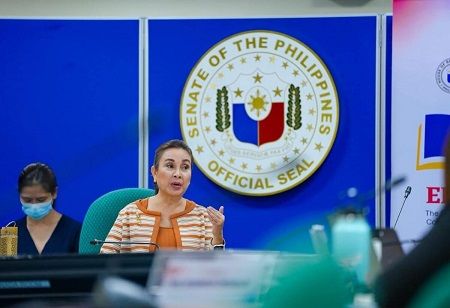Senator Loren Legarda, chair of the Second Congressional Commission on Education (EDCOM II), called for swift action in fortifying students' basic skills after data indicated that 18.9 million Filipinos who graduated from the Philippines' basic education system from 2019 to 2024 are 'functionally illiterate'.
This finding was disclosed during a public hearing of the Senate Committee on Basic Education, led by EDCOM II Co-Chairperson Sen. herwin Gatchalian, following the presentation of the Philippine Statistics Authority (PSA) on the initial findings of the 2024 Functional Literacy, Education and Mass Media Survey (FLEMMS). "This is a painful indictment of our education system", Legarda said.
"It unveils a systemic failure that informs us that school attendance and graduation no longer ensure real human learning. When millions of students finish basic education without the capacity to understand what they read, they are being released into the world ill-prepared except for a diploma with little actual bearing on their lives".
The PSA's FLEMMS is a national, household survey administered every five years. It has just implemented a new approach to estimating basic and functional literacy in the Philippines.
In its new definition, "functional literacy" not only entails the reading, writing, and computation capabilities, but also having higher-level comprehension abilities, such as combining two or more units of information and drawing inferences from the information. "Foundational learning, as EDCOM II has all along promoted, should be our very first concern. When a child cannot read or does not possess basic competencies by Grade 3, they start falling behind in all subjects, because all learning is predicated on the capacity to read and comprehend text", Legarda said.
"Reading with understanding is the mental engine that propels independent thought, curiosity, and lifelong learning. It equips children not just to respond to questions, but to ask the right questions, and to move in the world with intelligence and agency".
Legarda cautioned that widespread functional illiteracy erodes inclusive growth, reduces workforce competitiveness in an increasingly changing labor market, and exacerbates social inequality.
"An education system that graduates students without comprehension skills cannot be expected to graduate a workforce that can compete, innovate, or participate meaningfully in democratic life", Legarda said.
"This failure not only deprives people of opportunities but also stifles economic potential and undermines the foundations of participatory governance". Legarda urged immediate and focused interventions in provinces with the highest rates of functional illiteracy to avoid further learning loss.
Aside from these short-term reactions, she stressed reinforcing core learning, especially in the early years when reading and comprehension begin to take form, and the structural column bases of the education system like having proper and secure classrooms, deploying qualified teachers, teaching, and non-teaching staff in schools, and providing them with the tools, training, and resources to give good quality education.
Legarda co-authored Republic Act No. 12028, or the Academic Recovery and Accessible Learning (ARAL) Program Act, which creates a free national learning intervention to assist under-performing students, especially in science, mathematics, and reading, to acquire competency levels as prescribed by the Department of Education for their respective grade levels.

